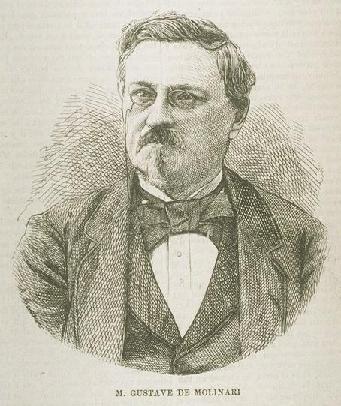Liberty Matters
On the Absence of Anarchy

The “pessimistic induction” — or, perhaps, the set of pessimistic inductions — on which Matt very reasonably focused our attention deserves continued reflection by anarchists. Why is there not more evidence of stable stateless social order? Why are anarchical societies not market-oriented? Is the growth of state power correlated with increasing wealth and social peace — and, if so why? It is hard to know whether Molinari drew back from his earlier radicalism because, as Matt supposes, he failed to find full-blown anarchist answers to questions like these plausible, but they certainly merit our careful attention in any case.
Two brief observations may help to further ongoing inquiry and analysis. At least, I hope, they will not further obfuscation.
One reason for the persistence of states and the relative absence of anarchy that hasn’t received much attention in this Liberty Matters exchange is ideological mystification. One reason we still have states, that is, is that people mistakenly believe we should or must. If one supposes, as I do, that ideas have real-world consequences, it should not be surprising that ideas which legitimate state power should help to keep the “statist quo” in place. Belief in the divine right of kings served to solidify royal power in the past — and the notion that God has placed a divine stamp of approval on those in authority has perhaps fostered docility in more recent times.
But secularists have their own legitimating myths as well. The belief that a Hobbesian Leviathan is needed to keep life from proving “solitary, poor, nasty, brutish, and short” may or may not be correct (I maintain, of course, that it is not); but its role in preserving state power is relatively independent of its truth. If people believe they need Leviathan, they will tend to support the existence of the state. Similarly, if people suppose that they have, in fact, consented to state authority, that they are obligated by a Lockean social contract, even if the idea of such a contract as binding evaporates under careful scrutiny, they will be more likely to treat themselves as bound whether they are or not.
Related means of legitimation also tend to keep people from taking the anarchic alternative seriously, too. If “anarchy” is repeatedly used as a synonym for “chaotic violence,” it will be difficult to talk about anarchist ideas without being treated as an apologist for thuggery. And the simple absence from the mainstream media of serious discussions of patterns of social organization radically different from those that currently obtain helps to dispose ordinary people not to think much, if at all, about radical alternatives and to treat such alternatives as not worth taking seriously when confronted with them.
In brief: People’s beliefs about the necessity of the state or the viability of alternatives impede their willingness to support radical change.
As regards Pinker-inspired views that link the growth of state power with increasing peace and prosperity: Suppose Pinker is right that increasingly strong states (for their own dubious purposes) fostered various social improvements. It hardly follows that other institutions couldn’t have done the same thing — even if, in fact, they didn’t for, among other things, the kinds of reasons I’ve already noted. I share Roderick’s skepticism regarding Pinker’s historical narrative, but accepting it wouldn’t mean embracing the conclusion that the state was necessary to the developments it purportedly midwifed.
In addition, it seems not unreasonable to wonder whether the state was in fact able to grow precisely because societal wealth was increasing. Rather than being the source of that wealth, state growth might be seen as parasitic on it. An elaborate state apparatus might stifle economic flourishing when resources were limited; a wealthier society, by contrast, could afford to support a parasitic state with less risk of collapse or complete stagnation. If we have good reason to regard the state as counterproductive, we will thus also have good reason to regard its growth as evidence, not that it also performs productive functions, but that society can manage to flourish despite the retardant impact of state action.
Doubtless these sorts of responses to the concerns that might have led to Molinari’s pessimism shouldn’t suffice on their own to allay any and all worries about the viability of anarchism. But those tempted to emulate Molinari’s doubts might at least wonder whether anarchy isn’t more viable than they might have feared.
Copyright and Fair Use Statement
“Liberty Matters” is the copyright of Liberty Fund, Inc. This material is put on line to further the educational goals of Liberty Fund, Inc. These essays and responses may be quoted and otherwise used under “fair use” provisions for educational and academic purposes. To reprint these essays in course booklets requires the prior permission of Liberty Fund, Inc. Please contact oll@libertyfund.org if you have any questions.